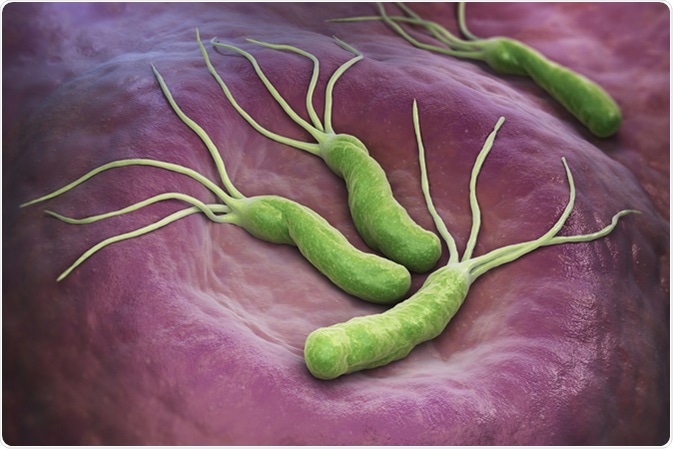The researchers examined the effects of using drugs from 41 categories, comparing more than 1,880 fecal samples from three groups: a cohort representative of the general population, one with inflammatory bowel disease (IBD) and a third group with individuals with IBD as well as healthy controls. They were looking for the effects of the use of a single drug, and then of multiple drugs used together. They analyzed the differences in the composition of the gut microbiota and the cellular metabolism induced by the drug, as compared to people not on the drug.
.jpg)
Normal flora of small intestine, bacteria Lactobacillus, 3D illustration. Image Credit: Kateryna Kon / Shutterstock
The gut microbiome
The term ‘gut microbiome’ refers to the whole of the microbial population in the gut, and is considered to be another and very valuable organ in the human organism. It is made of almost 40 trillion bacteria, viruses and fungi, with the bacteria belonging to a thousand or more species. The composition of the gut bacteria is different between different individuals and population groups, notably affected by food patterns and by medications.
Over the last two decades, a number of researchers have shown that the gut microbiome is implicated in the etiology of a host of serious and chronic lifestyle conditions, including obesity, diabetes, liver disease, cancer, dementia, and other neurological disorders due to brain degeneration.
The offenders
The study identified four drug categories that had the largest impact on the microbiome, namely:
- Proton pump inhibitors (PPIs)
- Metformin
- Antibiotics
- Laxatives
PPIs are commonly used to treat digestive disorders such as flatulence and heartburn. Such conditions affect 11% to 24% of the population in Europe. These drugs are also useful for peptic ulcer treatment, and to eradicate the implicated bacterium Helicobacter pylori from the stomach lining. It is also used to treat esophageal metaplasia and gastroesophageal reflux. PPI users had increased numbers of bacteria in the upper digestive tract because of the reduced acidity, as well as higher levels of fatty acid synthesis within the gut lumen.

Helicobacter Pylori is a Gram-negative, microaerophilic bacterium found in the stomach. 3D illustration. 3D rendering. Image Credit: Tatiana Shepeleva / Shutterstock
Metformin is used in the treatment of type 2 diabetes, which is found in 10% of the adult European population. Metformin causes an increase in the population of a potentially harmful bacterium, Escherichia coli, which can cause different types of infection.
Antbiotics are used by more than one in three Europeans each year for bacterial infections.
Laxatives are used to relieve tight bowel motions or to prevent constipation, which affects 17% of adults in Europe.
The current study also concluded that another seven drug groups cause marked changes in the gut bacterial populations. For instance, the type of antidepressant called selective serotonin reuptake inhibitor (SSRIs) can cause a steep increase in the numbers of Eubacterium ramulus, a potentially harmful bacterial species. And the intake of oral steroids can cause an abundance of methane-producing bacteria, a phenomenon already linked to obesity and to a high body mass index.
Summary
When prescribing drugs, it is important to know how they can affect the already ill patient’s gut working by producing fundamental changes in the gut bacterial pattern. It is also important to know how these changes can in turn affect the way the patient responds to other necessary drug treatments, as well.
Researcher Arnau Vich Vila says, “We already know that the efficiency and the toxicity of certain drugs are influenced by the bacterial composition of the gastrointestinal tract and that the gut microbiota has been related to multiple health conditions; therefore, it is crucial to understand which the consequences of medication are use in the gut microbiome. Our work highlights the importance of considering the role of the gut microbiota when designing treatments and also points to new hypotheses that could explain certain side-effects associated with medication use.”
Journal reference:
Vich Vila, A. et al., 2019. Impact of 41 commonly used drugs on the composition, metabolic function and resistome of the gut microbiome. Presented at UEG Week Barcelona October, 2019.